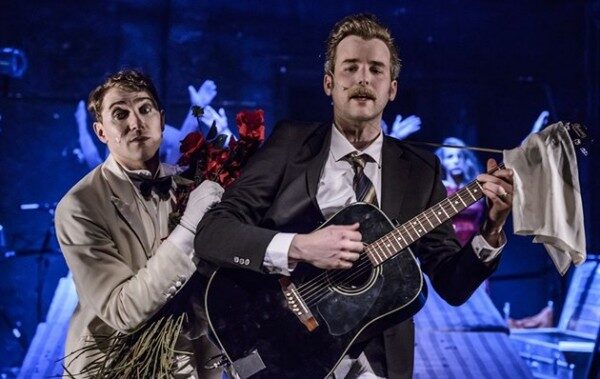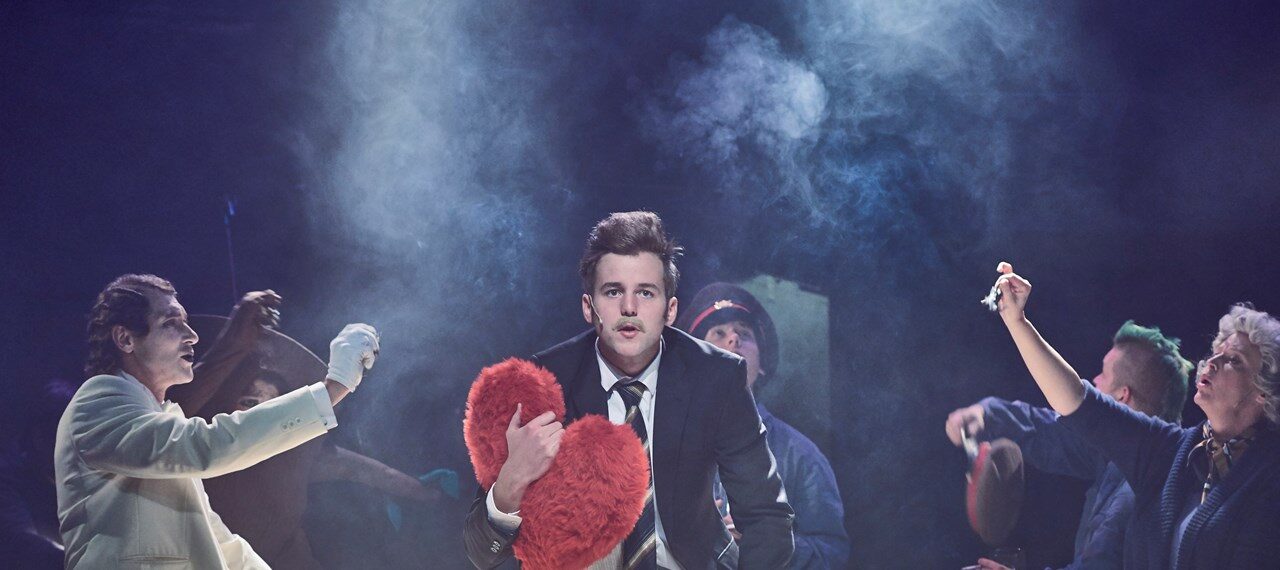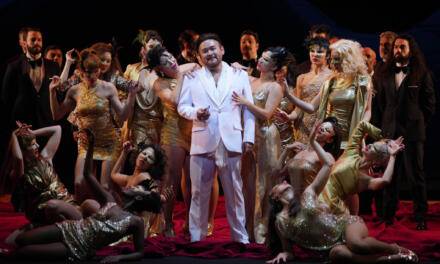“The great funeral of Havel, a grey-haired Casanova who smoked too much,” says Uncle Miloš, with the pomaded hair and white evening suit of a 1930s matinee idol, and who steps over to awaken Havel, lying in a still state, with a cigarette.
The stage is then set for a fast-paced musical: Velvet Havel is an absurdist exploration of Havel, the man in search of truth and ideals, the dissident and improbable politician, his loves, and his humanity with all its flaws. We’re taken into the 1960s with Olga, Havel’s wife who manages to smoke four ciggies at once tucked into her fingers sings her story: “I don’t display them like buns in an oven.” Meanwhile, a younger woman cavorts with her husband, who confides, “You’d never imagine how difficult it is to unbutton a bra – I’ll have to ask Olga.”

Image Courtesy of the Central and Eastern European London Review
Slapstick comedy, philosophy, and music continue to collide in an entertaining elision of scenes. “National pride is a great luxury for a small nation,” says Havel as he envies the Poles of their greatness. Olga settles into a deck chair, as a tree announces that he is universal, and, in one moment takes on the role of Salman Rushdie telling us that Havel’s “the only president not afraid to meet me,” and in another moment becomes the Dalai Lama with a water pistol. Olga is always at hand to provide sanguine advice to her husband: “Don’t soil your pants with all your understanding.” Havel’s time in prison reveals to him that prisoners don’t even have the right to joke: “Trust and love must prevail over hatred and lies.”
Velvet Havel (Written/Composed by Miloš Orson Štědroň, 2014) was presented by the Prague based Theatre of the Balustrade, where Havel developed his talents as a playwright in the 1960s. Havel, however, was forced to leave in 1968, after his activities in the Prague Spring brought him under the surveillance of the secret police. He faced a number of stretches in prison – the longest being nearly four years between 1979 and 1983 – which were documented in letters to his wife and later published in Letters to Olga (1989). Regardless, none of these deterred Havel, whose Civic Forum party played a key role in the 1989 Velvet Revolution and the subsequent break-up of the Warsaw pact countries.

The character Havel in Rich Mix’s production of Velvet Havel. Image Courtesy of the Central and Eastern European London Review.
Štědroň’s tale takes us on Havel’s Journey to becoming the first president of post-communist Czechoslovakia in 1989 and subsequently becoming President of the Czech Republic in 1993. His womanizing finally catches up with him when his lover reveals her pregnancy, leading Havel to dream that Olga would look after everything. Havel’s hopes for domestic harmony are dashed when the tree from before emerges as Hans Kaspar; he says that Havel has won the heart of the doggedly patient Olga and that his lover has had an abortion – for he is too much of a child to be a father.
Havel remains a much-loved hero of the Czech Republic for his courage as well as his common humanity. As a result of a popular online petition, Prague Airport was renamed the Václav Havel Airport Prague in 2012.
There was a lot of laughter and cheers emanating from the audience during the performance which, unsurprisingly, was sold out at Rich Mix. Velvet Havel is a well-deserved winner of five major Czech Theatre Critics’ Awards and is part of a month-long celebration by the London Czech Centre marking 30 years since the Velvet Revolution.
More information:
- Velvet Havel: http://london.czechcentres.cz/programme/travel-events/velvet-havel1/
- Miloš Orson Štědroň: http://www.orson.cz/content/text/cz/?zivotopis
- Theatre of the Balustrade http://www.nazabradli.cz
This article was originally posted on the Central and Eastern European London Review on Saturday, November 30, 2019. To read the full article, click here.
This post was written by the author in their personal capacity.The opinions expressed in this article are the author’s own and do not reflect the view of The Theatre Times, their staff or collaborators.
This post was written by Alison Miller.
The views expressed here belong to the author and do not necessarily reflect our views and opinions.


















